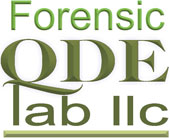What is a Document Examiner?
Anonymous letters, signatures or writing in question, altered documents – all these and more come under a forensic document examiner’s job description.
A Forensic Document Examiner is not a degreed course of study conveyed by a college, but rather a disciplined study of handwriting and document examination with at least a two-year apprenticeship under the tutelage of a mentor, who is recognized as an expert in the field.
“Forensic” means “the application of science to law.” A Forensic Document Examiner – also known as Questioned Document Examiner – discovers and develops evidence from a document or handwriting that can be used as support for an opinion in a court of law.
As a Handwriting Expert, it is my job is determine whether handwriting or printing is authentic or a result of disguise, simulation, tracing or simply someone else’s writing altogether. I study and identify signatures, hand printing, handwriting, initials, and numbers.
As a questioned document examiner, I also study documents made by computer printers, typewriters, copy machines and fax machines. I compare papers, inks, printing, typewriting, computer-generated documents, facsimiles, photocopies, rubber stamps and holes made by a stapler, perforations or hole punch.
Recently there has been some need for the analysis of digital signatures. I can decipher and analyze those as well.
Since the tremendous success of television shows like CSI and Forensic Files, we are often asked about our job and the “glamorous” work we do. While most people would not find laboratory work appealing, I find the examination of handwriting and documents highly intriguing. Analyzing documents is done in methodical (sometimes tedious) systematic way so that as much of the scientific evidence as possible is considered before an opinion is formed – rather like putting together a puzzle.
The balance of the job is best described by referring to the job description recently posted by the Los Angeles County District Attorney’s Office as follows:
Essential Job Functions
Identifies or eliminates writers of questioned documents (e.g., threat and extortion letters, bank robbery notes, and contracts) by comparing the details and elements of the questioned writing against known handwriting specimens using microscopes, optical aids, and other instruments.
Examines and compares typewriters and other methods of mechanical printing and copying processes with questioned documents in order to determine the identity of the typewriter, printer, or other printing and copying equipment or methods of reproduction, through the analysis of type alignment defects, clogged or broken typeface, and proportional spacing.
Analyzes various elements (e.g., paper, indentation, and sequence of writing) of questioned documents in order to determine their authenticity and author by comparing the original manufacturer’s date with the date appearing on the questioned documents; analyzing alterations, erasures, and substitutions; and determining the types of ink that was utilized in their development.
Examines altered and illegible documents such as torn, charred, eradicated, or obliterated samples in order to decipher or restore the original writing or text using the appropriate analytical procedures or techniques including the use of photography, digital enhancement, and ultraviolet and infrared radiation.
Prepares formal written reports detailing the findings (e.g., authenticity of the questioned document and identity of the author), investigative methods and laboratory techniques used in the examination, and conclusions of questioned document examinations.
Testifies in court as an expert witness and prepares court exhibits, if appropriate. Reviews and keeps current on the latest technical advances and legal issues (e.g., advances in scientific microscopy and photographic equipment; current case law; and rules of evidence) affecting the profession.
Maintains reference files of items such as typewriters, check-writers, ink, pens, pencils, paper, and other related elements of forensic document examination.
Source: http://da.co.la.ca.us/hr/b1045.htm
